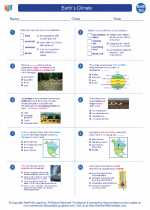Decomposers
Decomposers are an essential part of the Earth's ecosystem as they play a crucial role in breaking down organic matter and recycling nutrients. They are responsible for the decomposition of dead plants, animals, and other organic materials, returning vital nutrients to the soil and making them available for other organisms.
Types of Decomposers
There are various types of decomposers, including bacteria, fungi, and some insects. Each type of decomposer has a specific role in the decomposition process. Bacteria and fungi are the primary decomposers, breaking down organic matter into simpler compounds. Insects such as beetles and worms also aid in the decomposition process by physically breaking down organic material and facilitating the work of bacteria and fungi.
Decomposition Process
The decomposition process starts when a plant or animal dies and its organic matter becomes available for decomposers. Bacteria and fungi then begin to break down the organic matter, releasing enzymes that help in the decomposition process. This results in the formation of simpler compounds such as carbon dioxide, water, and minerals, which are then recycled back into the ecosystem.
Importance of Decomposers
Decomposers are crucial for maintaining the balance of nutrients in the ecosystem. Without decomposers, dead organic matter would accumulate, and nutrients would be locked up and unavailable for other organisms. Decomposers also play a vital role in waste management and soil formation, contributing to the overall health and fertility of the ecosystem.
Study Guide
- Define decomposers and explain their role in the ecosystem.
- List and describe the different types of decomposers.
- Outline the process of decomposition and the role of bacteria, fungi, and insects in this process.
- Discuss the importance of decomposers in nutrient recycling and waste management.
- Explain how the absence of decomposers would impact the ecosystem.
◂Earth Science Worksheets and Study Guides High School. Earth`s Climate

 Worksheet/Answer key
Worksheet/Answer key
 Worksheet/Answer key
Worksheet/Answer key
 Vocabulary/Answer key
Vocabulary/Answer key
 Vocabulary/Answer key
Vocabulary/Answer key
 Vocabulary/Answer key
Vocabulary/Answer key
